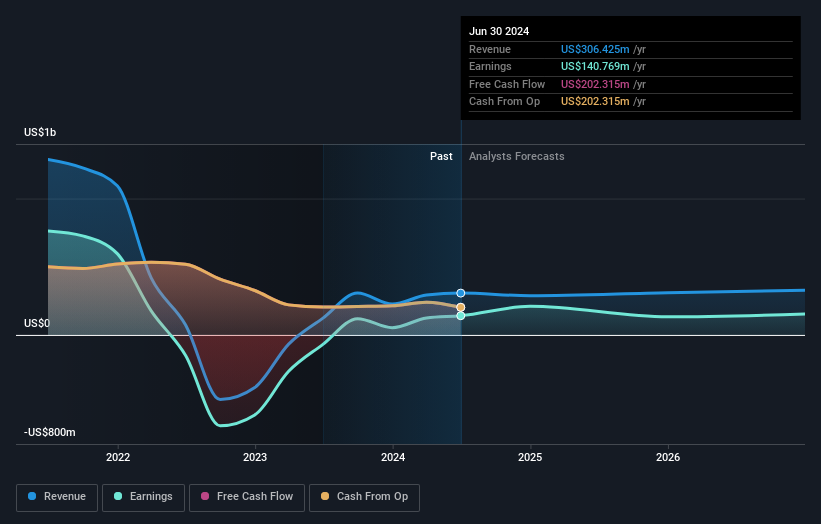- United States
- /
- Mortgage REITs
- /
- NYSE:CIM
Institutional investors in Chimera Investment Corporation (NYSE:CIM) lost 4.0% last week but have reaped the benefits of longer-term growth

Key Insights
- Given the large stake in the stock by institutions, Chimera Investment's stock price might be vulnerable to their trading decisions
- A total of 25 investors have a majority stake in the company with 47% ownership
- Using data from analyst forecasts alongside ownership research, one can better assess the future performance of a company
Every investor in Chimera Investment Corporation (NYSE:CIM) should be aware of the most powerful shareholder groups. And the group that holds the biggest piece of the pie are institutions with 54% ownership. That is, the group stands to benefit the most if the stock rises (or lose the most if there is a downturn).
Institutional investors was the group most impacted after the company's market cap fell to US$1.2b last week. However, the 13% one-year returns may have helped alleviate their overall losses. We would assume however, that they would be on the lookout for weakness in the future.
In the chart below, we zoom in on the different ownership groups of Chimera Investment.
See our latest analysis for Chimera Investment

What Does The Institutional Ownership Tell Us About Chimera Investment?
Institutional investors commonly compare their own returns to the returns of a commonly followed index. So they generally do consider buying larger companies that are included in the relevant benchmark index.
As you can see, institutional investors have a fair amount of stake in Chimera Investment. This suggests some credibility amongst professional investors. But we can't rely on that fact alone since institutions make bad investments sometimes, just like everyone does. It is not uncommon to see a big share price drop if two large institutional investors try to sell out of a stock at the same time. So it is worth checking the past earnings trajectory of Chimera Investment, (below). Of course, keep in mind that there are other factors to consider, too.

Institutional investors own over 50% of the company, so together than can probably strongly influence board decisions. Hedge funds don't have many shares in Chimera Investment. The company's largest shareholder is The Vanguard Group, Inc., with ownership of 9.8%. For context, the second largest shareholder holds about 9.2% of the shares outstanding, followed by an ownership of 6.2% by the third-largest shareholder.
A deeper look at our ownership data shows that the top 25 shareholders collectively hold less than half of the register, suggesting a large group of small holders where no single shareholder has a majority.
While it makes sense to study institutional ownership data for a company, it also makes sense to study analyst sentiments to know which way the wind is blowing. Quite a few analysts cover the stock, so you could look into forecast growth quite easily.
Insider Ownership Of Chimera Investment
The definition of company insiders can be subjective and does vary between jurisdictions. Our data reflects individual insiders, capturing board members at the very least. Company management run the business, but the CEO will answer to the board, even if he or she is a member of it.
Insider ownership is positive when it signals leadership are thinking like the true owners of the company. However, high insider ownership can also give immense power to a small group within the company. This can be negative in some circumstances.
Our most recent data indicates that insiders own less than 1% of Chimera Investment Corporation. Keep in mind that it's a big company, and the insiders own US$11m worth of shares. The absolute value might be more important than the proportional share. Arguably, recent buying and selling is just as important to consider. You can click here to see if insiders have been buying or selling.
General Public Ownership
The general public-- including retail investors -- own 45% stake in the company, and hence can't easily be ignored. While this size of ownership may not be enough to sway a policy decision in their favour, they can still make a collective impact on company policies.
Next Steps:
It's always worth thinking about the different groups who own shares in a company. But to understand Chimera Investment better, we need to consider many other factors. Consider for instance, the ever-present spectre of investment risk. We've identified 4 warning signs with Chimera Investment (at least 2 which make us uncomfortable) , and understanding them should be part of your investment process.
If you are like me, you may want to think about whether this company will grow or shrink. Luckily, you can check this free report showing analyst forecasts for its future.
NB: Figures in this article are calculated using data from the last twelve months, which refer to the 12-month period ending on the last date of the month the financial statement is dated. This may not be consistent with full year annual report figures.
New: AI Stock Screener & Alerts
Our new AI Stock Screener scans the market every day to uncover opportunities.
• Dividend Powerhouses (3%+ Yield)
• Undervalued Small Caps with Insider Buying
• High growth Tech and AI Companies
Or build your own from over 50 metrics.
Have feedback on this article? Concerned about the content? Get in touch with us directly. Alternatively, email editorial-team (at) simplywallst.com.
This article by Simply Wall St is general in nature. We provide commentary based on historical data and analyst forecasts only using an unbiased methodology and our articles are not intended to be financial advice. It does not constitute a recommendation to buy or sell any stock, and does not take account of your objectives, or your financial situation. We aim to bring you long-term focused analysis driven by fundamental data. Note that our analysis may not factor in the latest price-sensitive company announcements or qualitative material. Simply Wall St has no position in any stocks mentioned.
About NYSE:CIM
Chimera Investment
Operates as a real estate investment trust (REIT) in the United States.
Proven track record average dividend payer.


